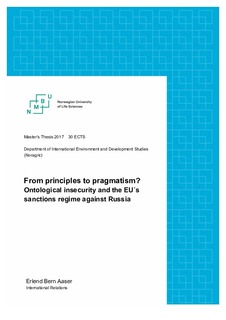| dc.description.abstract | In 2014, the relationship between the European Union (EU) and Russia turned from cooperation to conflict. The backdrop of this stalemate was the Russian annexation of Crimea, which the EU responded to by implementing sanctions. While both scholars and politicians doubted that the EU would be able to implement such restrictive measures, a normalization of relations has yet to establish. This thesis sets out to examine how this policy can be understood as a security concern and how it has been made possible through discursive framing. Embedded in this inquiry is an interest in how we can understand the EU as a global actor in 2017. These questions guide this thesis and its objective of providing a more comprehensive understanding of the sanctions policy. Arguing that sanctions is about more than physical deterrence, ontological security theory is applied as the theoretical framework. To examine how we can understand ontological security concerns as an integral part of the sanctions policy, a discourse analysis is undertaken of the official EU response in 2014. Within the sanctions discourse, a principled and a pragmatic representation is observed. These representations open for different interpretations of both the Self and the Other, and thus make possible different policies towards Russia. In 2014, the principled representation attained dominance within the discourse. While the pragmatic representation remained to be sub-ordinate within the discourse in 2014, it has gained legitimacy as the sanctions policy struggled to materialize as a political success. Symbolic of this, is the release of the new European Union Global Strategy (EUGS) which argues towards a more geopolitical EU. As such, a more pragmatic approach to relations with Russia has gained legitimacy since 2014. But, a discursive leap from principles to pragmatism is not unproblematic. As this analysis will argue, questions of time cannot be separated from ontological security concerns. | nb_NO |

